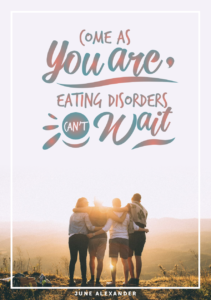Ardent health professionals promote eating disorder care in São Paulo

Ardent health professionals promote eating disorder care in São Paulo
A group of 120 health care professionals are uniting to promote the World Eating Disorders Action Day in São Paulo, Brazil. The health care professionals comprise physicians, psychiatrists, nutritionists, psychologists, physical educators, physiotherapists, nurses and social workers who volunteer, offering free treatment within the public health system.
They are members of the Brazilian Association of Eating Disorders (ASTRAL), along with the Program of Eating Disorders of the Institute of Psychiatry, Hospital das Clínicas, Faculty of Medicine, University of São Paulo (AMBULIM-IPq-HCFMUSP), the Program for Attention to Eating Disorders of the Federal University of São Paulo (PROATA-UNIFESP), and the Specialized Group on Nutrition, Eating Disorders and Obesity (GENTA) are all participating in this collaboration.
The health professionals provide an thorough account of the benefits and the challenges they face in providing eating disorder care for Brazilians. Here is their story:
Our programs have been offering treatment for patients with Eating Disorders for more than 25 years, within the two largest public universities in the state of São Paulo. Therefore, they also are the reference point for eating disorder care in Latin America.
Making initial contact
People who are experiencing symptoms of eating disorders can look us up through our contact phone, our email or through an online entry form for treatment *. From this initial contact, people will be called for a screening consultation, in which the professionals of the team specializing in eating disorder (psychiatrist, psychologist and nutritionist) listen carefully to the life history, current complaints and difficulties with weight maintenance, relationship with body image, personal, family, social and professional relationships.
After this screening, the Team discusses the information collected and, obeying the diagnostic criteria, the patient is guided to the beginning of the treatment. The treatment of patients diagnosed with an eating disorder is carried out by a multidisciplinary team, with the assistance of psychiatrists, psychologists, nutritionists, social workers, occupational therapists, nurses, physiotherapists and physical educators.
Treatment in the public health system is free
In addition to the free outpatient treatment, we also have the hospital admission service. The hospitalization can occur in a general psychiatric ward or in the only specialized nursing ward in Brazil in eating disorder, which is located in AMBULIM. We emphasize that all the service described here is entirely free, according to the Brazilian public health system.
During treatment, patients, relatives and carers can participate in supporting therapeutic groups directed and organized by psychologists. Patients are accompanied by psychiatrists in individual consultations, psychologists (individually and in groups), by nutritionists (individually and in psychoeducational groups), by physiotherapists and physical educators (in groups). The relatives are accompanied by a group led by psychologists, for psychoeducational meetings to better guide families and caregivers.
Family support includes free childcare programs
Child care programs follow the same structure and are also free of charge: individual psychiatric care, individual and group psychological care, individual nutritional care, group care for mothers, psychoeducational counseling for family members and people who make up the patient support network. This program also includes outpatient and hospital admission.
A waiting list due to shortage of specialist practitioners
Unfortunately, by now, we have a waiting list that, slowly, we try to reduce. However, the lack of other specialized centers for eating disorders prevents fast and efficient referrals. Eating disorders are poorly understood, leading to a shortage of specialist practitioners in the area. The lack of legitimacy and representation in public health policies are also an impediment to the creation of other centers such as ours.
Shortage of funds for research and maintaining services
From our experience, we observed the need to go beyond the walls of our institutions, in an action of prevention, alertness, legitimacy and political-social representativeness. In Brazil, we face many difficulties of resources, both for the development of research and for structuring and maintaining our services. And, as we have observed an increase in the incidence of eating disorders, especially in adolescents and young adults, it´s very important to involve the community, breaking the stigmas of psychiatric illnesses, and showing the relevance of discussing eating disorders.
Volunteer professionals at community park gathering on World ED Action Day
The action we want to develop in World Eating Disorders Action Day Brazil will take place in a public park where volunteer professionals will be available for guidance, information and prevention of this mental illness. The event will be open to the community and all those who are passing through the park can benefit from knowing the action and get informed about this serious pathology.
Professionals, people suffering from eating disorder and their caregivers are also especially invited to participate in the action of this day in order to have active and energizing leisure, caring for their self-esteem and relationships with those who do their professional and affective care / day-to-day activities (highlighting family members).
Bringing everyone together to educate and motivate
Therefore, our action aims to bring together people who are directly connected with eating disorders and the community, showing and orienting about the risk factors, as well as presenting ways to seek treatment. With regard to prevention, we intend to show the community that comments that negatively affect self-esteem and body image can lead people to intense pathways of suffering.
In short, in addition to our daily treatment of eating disorders, another great motivation for our engagement in this Action Day is the support of the Academy for Eating Disorders, for providing us with materials and making it possible to work together.
* AMBULIM – http://www.ambulim.org.br/TranstornosAlimentares/SolicitacaoTratamento
PROATA – http://www.proata.com.br/tratamento/
About the Organizing Committee (authors of this article)
 Prof. Dr. Táki Athanássios Cordás
Prof. Dr. Táki Athanássios Cordás
Founder and General Coordinator of AMBULIM, coordinator of the Clinical Assistance of the Institute of Psychiatry of HCFMUSP. Master and PhD in Medicine from the Department of Psychiatry, Faculty of Medicine, University of São Paulo. Professor of the Postgraduate Programs of the Department of Psychiatry of USP, of Neurosciences and Behavior of the Institute of Psychology of USP and of Experimental Pathophysiology of FMUSP.
 Profa. Dra. Paula Costa Teixeira
Profa. Dra. Paula Costa Teixeira
Professional in Physical Education, PhD in Neurosciences and Behavior by the Institute of Psychology of USP. Specialist in Theories and Techniques for Integrative Care by UNIFESP. Enhanced in Eating Disorders and voluntary of the Program of Eating Disorders – AMBULIM-IPq-HCFMUSP. Member of the Expert Group on Nutrition, Eating Disorders and Obesity – GENTA. Responsible for the production of content on the website of the Brazilian Association of Eating Disorders – ASTRAL. Professor responsible for physical education of the first Integrated Prevention Program of Brazil, held in municipal schools of SP, called New Moves. Idealizer of the Intuitive Exercise.

Marcela Nunes Paulino de Carvalho
Clinical psychologist specialized in Hospital Psychology by the Central Institute HC-FMUSP. Post-graduate in Psychoanalytical Theory by PUC. Improved in Eating Disorders and voluntary of the Program of Eating Disorders – AMBULIM-IPq-HCFMUSP and the Program of Attention, Teaching and Research in Eating Disorders in Childhood and Adolescence (PROTAD-IPq-HCFMUSP). Responsible for the production of content on the website of the Brazilian Association of Eating Disorders – ASTRAL.

Graziela Dassoler
Psychologist Clinical Specialist. Bachelor of Business Administration from FAAP. Psychologist by Universidade Paulista UNIP. Specialization in Analytical Psychotherapy and Body Approach by the Sedes Sapientiae Institute. Specialization in Eating Disorders and Obesity by CEPSIC of the Central Institute of HCFMUSP. Enhanced in Eating Disorders and voluntary of the Program of Eating Disorders – AMBULIM-IPq-HCFMUSP. Instructor Mindfulness Based Eating Awareness Professional Training (MB-EAT). Voluntary collaborator of the Brazilian Association of Eating Disorders – ASTRAL.
 Mireille Coelho
Mireille Coelho
Member of the American Academy for Eating Disorders (AED) and the Brazilian Association of Psychiatry (ABP). Master’s and Doctorate (in progress) by the Department of Psychiatry and Medical Psychology of the Federal University of São Paulo (UNIFESP / EPM). Psychiatrist of the Program for Attention to Eating Disorders (PROATA), Department of Psychiatry, UNIFESP / EPM. Specialization in Psychiatry by the Brotherhood of Santa Casa de Misericórdia de São Paulo (ISCMSP), and Specialist Degree in Psychiatry by the Brazilian Association of Psychiatry (ABP). Graduation in Medicine from the Federal University of Paraíba (UFPB).

Profa. Dra. Karin Louise Lenz Dunker
Nutritionist formed by FSP-USP. Master and PhD in Applied Human Nutrition. Postdoctoral fellow by the Department of Psychiatry and Medical Psychology – UNIFESP. Volunteer nutritionist of the Program for attention to eating disorders (PROATA) – UNIFESP. Member of the Expert Group on Nutrition, Eating Disorders and Obesity – GENTA and responsible for the Nucleus Prevention. Author of the first Integrated Prevention Program of Brazil, held in municipal schools of São Paulo, called New Moves.
About World Eating Disorders Action Day 2019
This year grassroots activists, volunteers, and over 250 organizations in 40+ countries are calling for caregivers to receive support, health care workers to be properly trained, and access to immediate, evidence-based treatment.
Why We Can’t Afford to Wait
- Worldwide over 70 million people are estimated to be affected by an eating disorder,
- Eating disorders have the HIGHEST MORTALITY RATE of any psychiatric illness
- Eating disorders affect people of all genders, sexual orientations, ages, socioeconomic class, abilities, races, and ethnic backgrounds. It is time to take action.
- Good news! When treated EARLY and correctly, eating disorders have the highest and fastest recovery rate!
How to support World Eating Disorders Action Day, June 2, 2019
- Join the movement, show your purple on social media! Use hashtag #ShowUsYourPurple
- Follow conversation on social media. Use hashtags #ShowUsYourPurple #WeDoActNow
- Host or attend an event. See http://www.worldeatingdisordersday.org/2019-events-2/
- Donate. To support the work see http://www.worldeatingdisordersday.org/get-involved/participating-organisations/.
- Discuss eating disorders. Through open, supportive dialogue, we can create change.
E-book release: Come as you are, eating disorders can’t wait

As a Participating Organisation supporting 2019 World Eating Disorder Action Day, The Diary Healerhas released a new ebook, Come as you are, eating disorders can’t wait. Stories from around the world illustrate that recovery from an eating disorder IS possible, at every age. The first step, is to seek help. Click here to purchase a copy for $9.97 (AUD) – all profits support eating disorder services.





